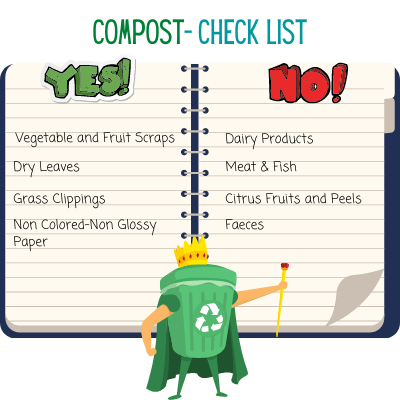Rahul loves cooking. Rahul produces loads of vegetable waste every day. Rahul throws away all the waste. Don’t be like Rahul. Start composting and Ask Rahul to compost.
An Indian family of 4 members produces between 2 – 2.5 kg of waste every day, out of which, more than 60% is organic. All this organic waste has the potential to be turned into a superfood for your plants with a technique called ‘Composting’. Keep reading to find your compost recipe.
Meaning of Composting
Composting is a process of converting degradable organic waste into a nutrient-rich fertilizer that can be further utilized to enrich your plants and soil. Sounds simple and interesting, right? It is!
What can compost?

Fruit and vegetable scraps, top of your strawberry, pineapple, etc., eggshells, grass clippings, tea leaves and bags, coffee grounds, hair, animal fur, old flowers, dry leaves, the list goes on. These organic materials are oxygen and nitrogen-rich and help in preparing healthy humus for your soil. The only secret to healthy compost is a good carbon to nitrogen ratio, where carbon content is in dominance.
Also, some brands are considerate enough to label some products as ‘compostable’ – like bags, pencils, wipes, even some sanitary napkins, etc. Do look out for such labels.
What not to put in compost?
You must avoid meat, fish, dairy products, citrus fruits and peels, bones, and animal feces, or else there will be unpleasant odours, swarms of flies, pests, and even animals.
Who can compost?
Anyone from children, and adults, to the elderly, can compost. You just need a small space, organic waste, and some enthusiasm.
Indoor composting vs Outdoor composting
The most common misconception about composting is that it is messy, causes odour, and is often termed a ‘complicated process. Well, it is none of these. In fact, composting is a fun exercise, especially during the pandemic when you might have some spare time in hand. It is easy, sustainable, and the need of the hour. We have also prepared a list of some amazing composters which you can keep indoors and make composting a simple and fun process.
How to compost at home?
- If you choose to prepare your compost indoors, then you may choose an appropriate composter. Place the bin in a dry area in your balcony, backyard, or kitchen.
- Start by adding crushed dry leaves at the bottom of the bin, to which, add compost remix powder – which is easily available in the market – to accelerate the process.
- To this, add alternate layers of moist and dry organic waste. Again, add some fistfuls of remix powder and cover the pile with a newspaper.
- If your bin does not have air vents, then it is important to keep turning your pile at least once in 5 days to aerate the pile. Also, keep wiping off moisture from the inner part of the lid to avoid excess moisture in the pile. You may also add some semi-composted waste to speed up the process.
- After being patient for 4 to 6 weeks, and have added the last stock of green waste, your waste would be converted into a dry, crumbly, dark brown compost which is ready to become a superfood for your plants and soil.
How to compost outdoors?
- For outdoor preparation, prepare your pile of around 5 ft. by 3 ft. on bare Earth, at a dry and shady place with good drainage to avoid water logging around the pile.
- Start with forming a layer of straws and twigs about 5 inches, to support the aeration of the pile.
- Then, alternate layers of moist and dry waste, sprinkling some untreated wood ash in thin layers. You may also add compost remix powder to accelerate the process.
- Finally, cover the pile with a plastic sheet to avoid excess moisture and flies. Sprinkle water occasionally to keep the pile moist, or you may also let the rain do its job.
It is important to give your pile a good turn with a pitchfork every few weeks to allow proper aeration, and the best time to do this is when the centre of the pile is warm- having a temperature of around 55° C to 65° C.
In case of an odour, readjust the ratios of browns and greens- you may also need to add more browns.
You will finally see a fluffy, dark brown compost after 4 to 6 weeks.
Composting Uses
- One big benefit of composting is the reduction of landfill waste where the organic waste takes a lot of time to decompose; the nutrients are also not utilized anywhere.
- Another pro is that you will have homemade manure and won’t have to rely on the harsh chemical fertilizers available at high prices in the market.
- Other advantages include a healthy plant and nutrient-rich soil.
Good things take time. So will your compost, to be formed.
Send in your composting pictures at gardenchee@gmail.com and we might post the most interesting ones.


34 Trellis Ideas To Make Your Garden Beautiful - Gardenchee
[…] Also Read: How To Start Composting At Home Easily? […]